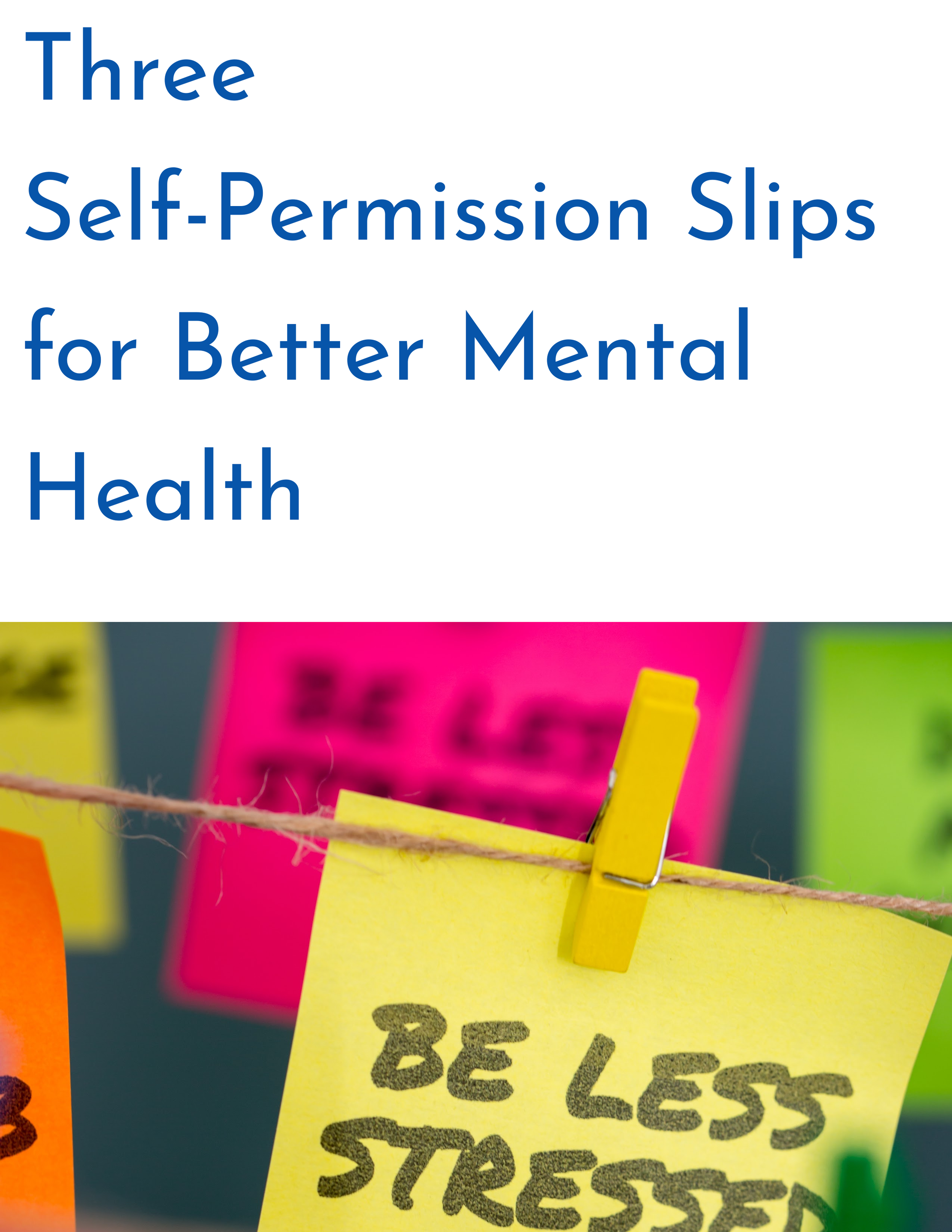Three Self-Permission Slips for Better Mental Health
Fighting with others is one thing, but fighting with yourself is another. That voice in your head can be relentless, constantly calling you names or doubting your choices. This voice is what we call “ negative self-talk” and it can run our day if we let it. It can push you to try and work when you are completely tired or coerce you into attempting to achieve when all you really want to do is spend time resting or meet with loved ones.
Quite often, it is a voice of anxiety that urges you to act on high expectations. For example, if you are worried your boss is angry because you’re not working enough hours outside of the office, then that voice appears. It lets you know the awful consequences of failing, convinces you that you need to act immediately, and if you don’t listen, it will constantly peck at you with guilt and more anxiety.
Negative self-talk can’t be solved with a simple trick, but what we can do is introduce a stronger voice. A purposeful inner speech that fights on behalf of your mental and physical health. Where negative self-talk manipulates or tortures you, positive self-talk includes giving yourself permission to do what you know is BEST for you. This means supporting yourself the way you would support a friend, and it starts with permitting yourself to feel emotions.
You Are Allowed to Feel
Self-criticism starts with the belief that you shouldn’t be feeling what you feel. That everyone else doesn't or shouldn't feel this way. You may think others don’t feel anxious or angry, and that you are just “abnormal” or “wrong." This self-criticism leads to spiraling into feeling anxious about having anxiety.
Feeling anxious does not mean anything about you other than you are a human like everyone else. While your anxiety may feel bad, it’s YOUR emotional experience and it serves as a message that danger is lurking around the corner. Permitting yourself to feel emotions does not mean approving of your anxiety or the perceived danger, but accepting that the emotion is there.
For example, if you see someone stealing, you do not approve of the mugger taking someone’s money, but you accept that the event is occurring. Then you can then make a choice on what to do, if that be to physically intervene or call the police. You are allowed to feel emotions, even ones that don’t feel good or look pretty to others. Giving yourself explicit permission to feel WHATEVER you are feeling is the acceptance that you are allowed to be impacted by what the world throws at you, just like everyone else.
You Are Allowed to Rest
Anxiety surrounding productivity is very common today. Growing up, you have places like school that give you grades and a clear structure that tells you if your work has been enough. However, there is plenty of life that does not have that structure or clear feedback that you’ve done enough work.
As we’ve talked about before, negative self-talk only enhances this anxiety, telling you all the consequences if you’re not working hard or long enough to satisfy expectations that may not even exist. Imagine you’re tired from a full 12-hour shift at the hospital and you come home dreadfully exhausted. If you think that you "need to be more productive" and attempt to work more, the product of your work will diminish. As a consequence, you might not finish your extra task and it only makes you feel more behind, then more exhausted and more anxious. Work is important, but how you take care of yourself is what creates sustainability.
Work is fueled by your physical and mental energy levels, which then are sustained by rest. Now physical rest is one thing, as you rest a sore leg you can work on your computer or fold laundry, and your leg will heal. However, mental rest is only found in allowing yourself to be free of work. If you’re overwhelmed with work from the day, and need time to rest, permitting yourself to do so is the difference between good rest and time spent ruminating on how you’re not working. So do yourself a favor and permit yourself to rest and play.
This is something you act on by being honest with yourself about what you need. Just like finding something to eat when you’re hungry, or sleeping when your body tells you you’re tired. Permit yourself to act on what your body and mind are requesting. Allow yourself to initiate rest, and sometimes that comes at the cost of other commitments.
You are Allowed to Quit
Quitting is stigmatized as an action that indicates weakness of character or will. You may have been told quitting is not an option once you’re committed. I will tell you, it all depends on context and what it is you’re committed to. If you accepted an invitation to go see a movie with friends and you’re too exhausted from work, then you are permitted to let them know you aren’t going. Will they be disappointed? Probably, but only because they wanted to spend time with you. On the other hand, there are many circumstances in which quitting would not be the best option.
Again, it all depends on context, but permitting yourself to quit does not mean you will quit EVERYTHING, it means you will find the balance. If you are in a toxic relationship you feel like you can’t leave, quitting is a viable option to best promote your mental and physical health. If a job is tearing you up inside, then it’s probably a good time to start looking for other jobs. The principle of never quitting is often a tool for those seeking to coerce you. As an advocate of your own health, it’s important your actions protect you. Your mental health and physical health make the vehicle that will take you where you want to go in life. They need to be protected, even if it means quitting.
Repeat After Me:
I am allowed to feel emotions
It does not make me weak, it makes me as worthy as everyone else
I am allowed to rest
It does not make me lazy, it makes me efficient and my efforts sustainable
I am allowed to quit
It does not make me undisciplined, it makes me responsible and healthy

